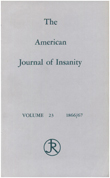The relationship of postdoctoral research training to current research activities of faculty in academic departments of psychiatry
Abstract
OBJECTIVE: This report describes the postdoctoral research training of faculty in departments of psychiatry and relates research training characteristics to current involvement in research. METHOD: Data were taken from a survey of 3,107 doctoral-level faculty in departments of psychiatry at 116 U.S. medical schools. The survey instrument gathered information about faculty members' postdoctoral research training and current research activities and elicited recommendations for research training programs. RESULTS: Of the survey respondents, 34.8% had had some form of postdoctoral research training. Most of those had trained in medical schools or intramural programs of the National Institutes of Health and federal institutes on alcoholism, drug abuse, and mental health. Most funding came from the federal government. Postdoctoral research training was significantly related to greater current research involvement across all degree types--M.D., Ph.D., and M.D.-Ph.D. Length of training was related to level of research involvement for M.D.s and Ph.D.s but not M.D.-Ph.D.s. Although most researchers believed their training programs prepared them for independent research, a smaller proportion of M.D.s than M.D.-Ph.D.s or Ph.D.s responded affirmatively to that question. Researchers were more likely than nonresearchers to consider their training adequate. Respondents rated time with mentor, course work in statistics, and length of training as the most important training program features. Both research training and research activities were concentrated in a relatively few institutions. CONCLUSIONS: These data show the critical importance of both federal support of research training and postdoctoral research training for subsequent research involvement of psychiatric faculty.
Access content
To read the fulltext, please use one of the options below to sign in or purchase access.- Personal login
- Institutional Login
- Sign in via OpenAthens
- Register for access
-
Please login/register if you wish to pair your device and check access availability.
Not a subscriber?
PsychiatryOnline subscription options offer access to the DSM-5 library, books, journals, CME, and patient resources. This all-in-one virtual library provides psychiatrists and mental health professionals with key resources for diagnosis, treatment, research, and professional development.
Need more help? PsychiatryOnline Customer Service may be reached by emailing [email protected] or by calling 800-368-5777 (in the U.S.) or 703-907-7322 (outside the U.S.).



